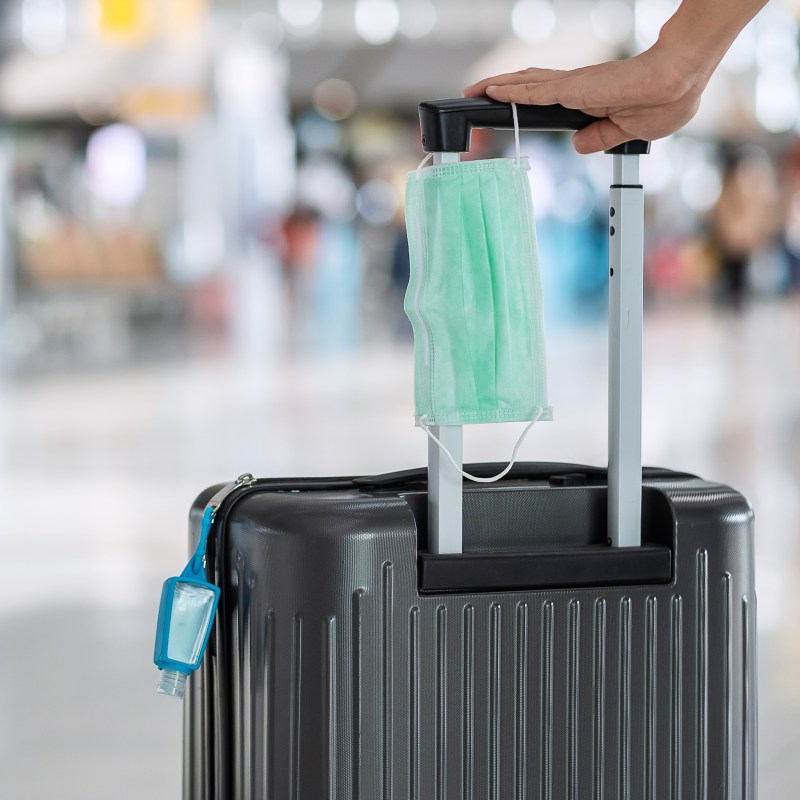
With the holiday travel season near, U.S. airports are preparing for an influx of travelers while maintaining their COVID-19 policies to make sure passengers stay and feel safe.
Videos by TravelAwaits
Airline passenger traffic is down on average around 70 percent from 2019, and if you haven’t stepped foot in an airport since March, as you might expect, things are different.
Airports have created helpful websites and apps for travelers in addition to paying extra attention to passengers’ safety through increased cleaning, strict mask rules, social distancing markers, and more.
We spoke with representatives from nine major U.S. airports about their COVID-19 policies so you know what to expect if you haven’t flown since March. Here’s how they’re protecting travelers and how you can be best prepared to fly.
Enhanced Cleaning
For starters, all airports have upped their cleaning protocol. Increased cleaning includes, but is not limited to, medical-grade cleaning supplies, disinfecting high-contact spaces like escalator handrails, electrostatic spraying, hand sanitizing stations, and trying out new cleaning technologies as they are developed.
Besides cleaning more frequently, some areas such as water fountains and hand dryers in restrooms may be off-limits.
Denver International Airport (DIA) installed over 100 hand-sanitizing stations in various locations throughout the airport.
“Each gate area is now equipped with disinfecting wipe dispensers for passengers to take a wipe onboard to sanitize their seat and tray on the plane,” said Alex Renteria, a Public Information Officer at DIA.
Social Distancing Reminders
All airports are enforcing social distancing through a variety of methods. Social distancing is encouraged through plexiglass barriers between staff and passengers, signage, markers for where to stand (and where not to stand), and overhead announcements about social distancing, wearing a mask, and washing hands.
Be prepared for reminders around the airport about COVID-19 etiquette and how you can stay as safe as possible.
Airports such as Salt Lake City Airport facilitate social distancing through helpful reminders.
“We have stickers on the floor to indicate social distancing as well as on the seats in the gate hold area,” said Nancy Volmer, Director of Communication and Marketing at the airport.
Rapid Testing On-Site
Airports such as Newark Liberty International Airport in New Jersey and JFK International Airport in New York both offer COVID-19 testing right at the airport.
The testing facilities are through XpresCheck, and three tests are available: a polymerase chain reaction (PCR) nasal swab test, a rapid molecular COVID-19 test, and a blood antibody test. Testing is available for airport employees and passengers alike. The test you choose may be covered by your insurer.
Other airports — such as Tampa International Airport — are following suit.
Mask Enforcement
Be prepared to wear a mask during your travel experience. Airport staff, TSA agents, customer service employees, and food and beverage staff will be required to wear masks at just about any airport you visit.
In addition to requiring a mask, you can expect airport staff going above and beyond to ensure masks stay on.
“Face coverings are required at Phoenix Sky Harbor, and in addition to PPE [which stands for personal protective equipment — think masks and gloves] vending machines, we have free masks available in bins outside our security checkpoints and at our customer Information Counters,” said Public Information Officer Greg Roybal in Phoenix.
“We also have staff walking around in vests that say PHX — Here for You Crew to hand out masks and remind travelers that they need to wear a facial covering,” Roybal said.
Other airports have similar systems in place.
“We have been encouraging throughout the process in a positive manner, including our Mask Up! Team, which offers masks to those who may not have them. Often, people ask to exchange the ones they do have,” said Media Relations Manager Perry Cooper from Seattle-Tacoma International Airport (SEA).
St. Louis Lambert International Airport (STL) also takes masks seriously.
“While we hope it is only needed as a last resort, STL Police will remove a person from the airport who is not willing to [wear a mask]. If a passenger is concerned that a business or STL employee is not wearing a mask at the airport, they can report that violation online,” said Public Information Manager Roger Lotz.
Cleaning Certifications
Some airports are going above and beyond to prove their cleaning strategies are top-tier.
Seattle-Tacoma Airport has an Airport Council International Airport Health Accreditation. The airport has over 280 sanitizing stations and over 8,000 social distancing and wellness signs.
Dallas/Fort Worth International Airport (DFW) has received similar accreditation.
“To provide customers with added reassurance of the airport’s cleanliness, DFW Airport worked to earn the Global Biorisk Advisory Council (GBAC) STAR Facility Accreditation and was the first airport in the world to achieve this recognition,” said Bill Begley, Senior Manager of External Communications at DFW.
On-Site Recommended Products
Before traveling, make sure to check TSA’s COVID-19 page about what you can and can’t bring through security.
“Travelers can temporarily bring up to 12 ounces of hand sanitizer with them in their carry-on and [there is] no limit to sanitizing wipes. Other cleaning products — if a liquid — would still need to conform to the current TSA carry-on policy of no more than 3.4 ounces or 100 milliliters carried in a quart-size bag,” said Rod Johnson, Assistant Director of Public Affairs for Orlando International Airport.
Many airports, including the busiest airport in the U.S., Atlanta’s Hartsfield-Jackson International Airport, are also stocking up shops and vending machines with masks, sanitizer, wipes, and other cleaning items for passenger convenience.
Minimized Contact
Though some parts of your airport experience will require you to touch surfaces, you can significantly reduce contact nowadays.
“We have encouraged our business partners to establish touchless applications where possible, and we encourage travelers to use mobile boarding passes wherever possible,” said Roybal, in Phoenix.
Some airport restaurants might offer touchless menu and payment options, such as in Denver. If you plan to dine at the airport, be prepared for reduced hours, limited capacity, and socially distanced seating.
Airports including Seattle-Tacoma are even offering pre-booked parking so you can eliminate contact with others as much as possible.
Apps And Websites
Many airports, including Phoenix, either have an app or a mobile-friendly website that allows you to see wait-times for security, updated flight information, tips for getting around, and other helpful information that will make your experience run more smoothly.
Two airports with specific user-friendly apps include Seattle and Denver.
“The SEA App is a great start to find information for FlyHealthy@SEA as well as airline information and maps that include locations for hand sanitizers,” according to a SEA representative.
“DEN has implemented VeriFLY, a free service designed for passengers looking for a little more confidence in their journey through the airport. VeriFLY allows people to make a reservation to access a dedicated TSA screening lane and a limited-capacity train car that connects DEN’s terminal with its three concourses. Anyone can make a reservation using a smartphone app, and to participate, you must conduct a health screening 24 hours before your reservation,” said Denver’s Public Information Officer.
Pro Tips
As always, it never hurts to arrive at the airport early. All airports suggest arriving at least two hours before your flight. That gives you plenty of time to beat the holiday crowds, find a spot at your gate, and feel more comfortable in your surroundings.
“We recommend passengers wear a mask, practice physical distancing, wash hands frequently, use hand sanitizer, cover one’s nose or mouth when coughing or sneezing, and stay home when sick,” said the Director of Communication and Marketing in Salt Lake City.
In addition, bring a mask or two (or even three!), wipes and sanitizer, and any other cleaning supplies that fit TSA’s guidelines. Also, check the airport’s website, app, or social media pages for the latest information.
Above all else, only travel if you feel comfortable and are prepared to do so.
“Pack your patience and be kind to other travelers!” said Assistant Director of Public Affairs at Orlando International Airport.
A new study recently showed exposure to COVID-19 on a plane is “virtually nonexistent.” To read more, click here.
